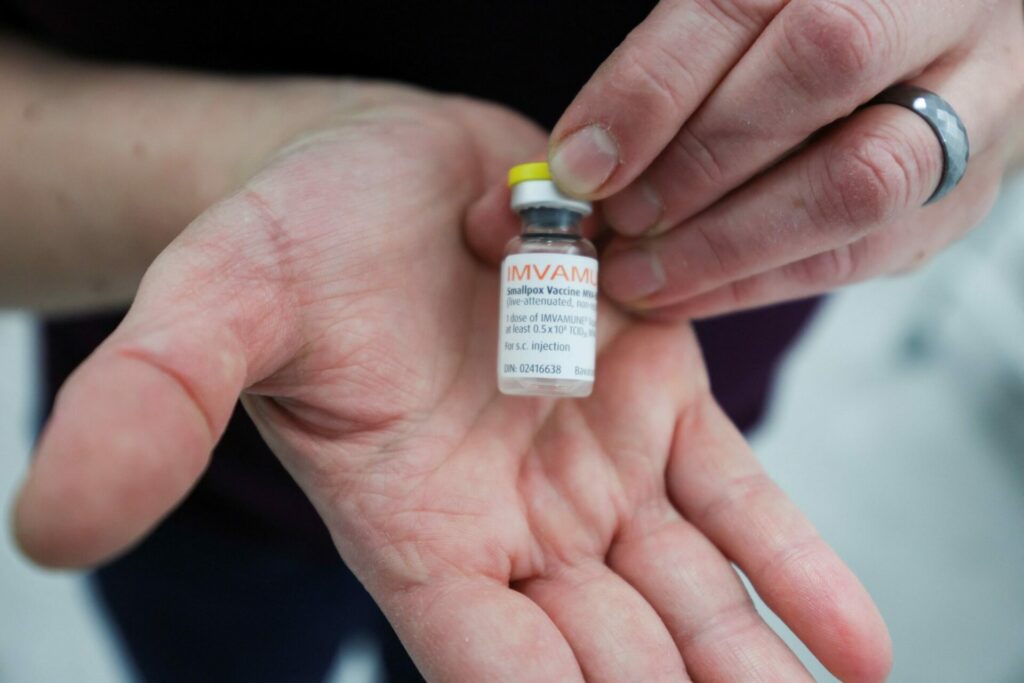The demand for the vaccine against monkeypox in Belgium is growing fast among men who have same-sex relationships, but the country does not have enough stock to give a shot to everyone who wants to be vaccinated.
While the Netherlands has started a preventive vaccination campaign for people who run a greater risk of getting infected, Belgium has done no such thing – despite the increasing demand for preventive vaccination against monkeypox among men who have sex with men, according to Laurens Liesenborghs, professor of emerging infectious diseases at the Institute of Tropical Medicine (ITG).
"For many gay men, the disease is getting closer: many now know someone who has had the monkeypox. Therefore, they are also becoming concerned about their health," he told De Standaard. "And they do not want to have to go into isolation and tell their colleagues or family that they have contracted monkeypox."
According to the latest figures by the Sciensano National Health Institute, 393 confirmed cases of monkeypox were reported in Belgium as of Monday 25 July: 218 in Flanders, 133 in Brussels and 42 in Wallonia.
Vaccination only under strict conditions
"Healthcare workers and people who had an unprotected high-risk contact with an infected person can get vaccinated against monkeypox in one of the nine reference centres," a statement by Sciensano reads.
While monkeypox is not a sexually transmitted disease, the virus does need long and close skin contact with an infected person to spread. "Vaccination should happen within four days after the contact. People who have not been vaccinated against the 'classic' smallpox should receive two doses, at least 28 days apart."
Those who think they qualify for vaccination are advised to contact their doctor, who can discuss their eligibility with the reference centre. "Due to the limited number of vaccines and the current uncertainty about additional supplies, this vaccination is only carried out under strict conditions."
Ideally, everyone who has an increased risk of being infected with monkeypox and wants to be vaccinated would be vaccinated in Belgium as well, said vaccinology professor at the University of Antwerp (UAntwerpen) Pierre Van Damme, who is a member of the Superior Health Council's group advising on vaccination against monkeypox. "But as there are only a few doses available, we have to choose who gets priority for the sake of public health."
Related News
- European Commission urges Member States to tackle monkeypox in coordination
- WHO: Monkeypox declared 'international emergency,' but no reason to panic
- Monkeypox: WHO warns about transmission during sex
The Netherlands is in a much better position, as it is among the few European countries that have replaced their older smallpox vaccines (those of the second generation) with the latest third-generation ones two years ago.
However, most other European countries, including Belgium, have not yet done that, Van Damme told De Standaard. "Smallpox has actually been eradicated, but the strategic stockpile of vaccines is important in case there is another outbreak. If the virus were to be used as a bio-terrorist weapon, for example."
In such a situation, the second-generation smallpox vaccine that Belgium has would certainly be suitable. "But in the case of monkeypox, the third generation smallpox vaccine is the only one that we can use widely. It has fewer side effects and is also suitable for patients with weakened immune systems, including HIV patients."
Larger shipment after summer
While Belgium has been able to buy some 3,000 vaccine doses, this stock is far too limited to start a broad vaccination campaign against monkeypox. The vaccines that are available will be reserved for people who have had contact with a monkeypox patient.
In the autumn, probably October-November, Belgium expects a larger shipment of vaccine doses, as Federal Health Minister Frank Vandenbroucke placed an order for 30,000 doses in mid-July.
In the meantime, the Flemish expertise centre for sexual health Sensoa has launched a prevention campaign against the monkeypox virus with an eye-catching image of two green pickles.
"It is an image that we borrowed from a Portuguese prevention organisation. With a wink and a nod, the image refers to male genitalia with all kinds of blisters on them," said Boris Cruyssaert of Sensoa on Flemish radio on Friday morning.
"We chose the image because it immediately attracts attention. The '+38 degrees' next to it refers to the body temperature, as another symptom of monkeypox is fever," Cruyssaert added.
Sensoa has decided to campaign only in the gay sex scene, as the centre specifically aims to reach men who often have changing sexual contacts. "Last week, we started distributing posters and small cards, in both Dutch and English. These will be distributed in the gay sex scene, such as bars and other establishments where many gay men go to have sex."
Should the monkeypox virus start spreading to other population groups, Sensoa will adjust its communication strategy, emphasised Cruyssaert.

